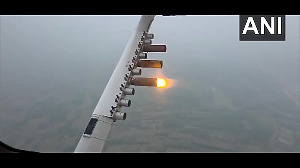It will be simplistic to assume that Pakistan just gave into Indian demands because of the rapidly deteriorating India-Pakistan and Pakistan-Afghanistan ties. More important is the pressure that the Pakistan government has come from the US in recent weeks. During Gilani's visit to Washington recently the Bush administration made it clear that its patience is running out with the shenanigans of Pakistan's security establishment and the role of the Inter Services Intelligence came under the scanner. The US intelligence is categorical about the ISI's involvement in the recent spurt in terrorist activities in Afghanistan and especially its role in the Kabul bombings.
With Iraq attaining a measure of stability, the focus in the US is almost entirely on the deteriorating situation in Afghanistan and both candidates for the White House have made Afghanistan their top foreign policy priority. This presents India with a unique opportunity to make changes in its own Afghanistan policy and make it more proactive than it has been so far. India's management of the security environment in its immediate neighbourhood is the first test of India's rise as a major global actor.
Forget China's rise, global climate change and the nuclear deal with the US that so consume India's strategic elites. All these dwarf in front of the challenge India faces in Afghanistan which is on the brink of collapse even as India continues to dither on how to respond adequately to the rapidly changing ground realities there.
India no longer has the luxury to argue that while it is happy to help the Afghan government in its reconstruction efforts, it will not be directly engaged in security operations. The Taliban militants who blew up the Indian embassy have sent a strong signal that India is part of the evolving security dynamic in Afghanistan despite its reluctance to take on a more active role in the military operations.
Progress towards stabilisation and development in Afghanistan is being heavily influenced by India and Pakistan, and the rivalry between them. Pakistan has always been suspicious of Delhi and Kabul cooperating against it, and as India's influence in Kabul has increased in post-Taliban Afghanistan, Pakistan has stalled in its efforts to curb extremists. Its failure to contain cross-border militancy has been a key factor behind its deteriorating relations with the Hamid Karzai government in Kabul.
Relations between Pakistan and Afghanistan have long been complex, with Islamabad's military-intelligence establishment contributing to the defeat of Soviet troops before 1988; the overthrow of Soviet-backed President Mohammad Najibullah in 1992; and the capture of large areas of Afghanistan by the Taliban after 1994. Several long-standing strategic interests fuelled Pakistan's involvement in these developments.
It has long believed that it can gain 'strategic depth' against India by influencing politics in Kabul, something Islamabad felt it achieved during in the 1980s and 1990s. It is keen to prevent 'strategic encirclement' as a result of closer Delhi-Kabul ties. Islamabad is wary of Afghanistan (or India) exerting influence on restive populations in border regions like Baluchistan and the North West Frontier Province.
However, the perceived gains of the last two decades have been increasingly under threat since the overthrow of the Taliban in 2001. After the terrorist attacks in the United States, President Pervez Musharraf had to choose between support for the US-led invasion of Afghanistan and its 'war on terrorism' or isolation as a backer of radical Islamic extremism. Musharraf promptly signed Pakistan up as an ally of Washington. This committed Pakistan to supporting efforts to stabilise Afghanistan and to strengthen the administration of President Hamid Karzai.
However, there are considerable doubts about Islamabad's capacity, and commitment, to crack down on militants. Kabul is deeply suspicious of Pakistan, on whom its security is largely dependent. Pakistan's ISI is linked to the resurgence of the Taliban, whose leadership is thought to be operating from tribal border regions. The rejuvenation of the Taliban has potential benefits for Pakistan in bolstering its role as a frontline State in the war on terrorism, thereby securing engagement from the United States. The security problems in Afghanistan can be linked the military's continuing position as the predominant force in Pakistan, an institution that has, since the 1990s, viewed the Taliban as a means of controlling Afghanistan and undercutting India's influence there. Having focused exclusively on the Taliban, it is struggling to abandon it now.
Meanwhile, as tension between Pakistan and Afghanistan has increased, India's relations with Afghanistan have steadily improved. Unlike Pakistan, ties between India and Afghanistan are not hampered by the existence of a contiguous, and contested, border. Its support for the Northern Alliance (against the Pakistan-backed Taliban) in the 1990s, strengthened its position in Kabul after 2001. Many members of the Alliance are members of the government or hold influential provincial posts. Delhi is one of Afghanistan's top six donors, having extended a $750 million dollar (about Rs 3,000 crore) aid package and most of its aid is unconditional, directed largely at reconstruction projects, as well as education and rural development.
Kabul is also encouraging Indian businesses to take advantage of its low tax regime to help develop a manufacturing hub in areas such as cement, oil and gas, electricity, and in services including hotels, banking and communications.
Karzai may not be deliberately crafting a Delhi-Kabul alliance against Islamabad, but he is certainly hoping to push Pakistan into taking his concerns more seriously. India has opened consulates in Herat, Mazar-e-Sharif, Kandahar and Jalalabad, in addition to its embassy in Kabul. Pakistan has accused the Kabul embassy of spreading anti-Pakistani propaganda and views the establishment of the consulates as a way for Delhi to improve intelligence-gathering against it.
After targeting personnel involved in developmental projects and emboldened by India's non-response, the terrorists have now trained their guns directly at the Indian State. India must now respond with greater military engagement to support its developmental and political presence in Afghanistan. This is the message that India should send categorically during Karzai's visit to India.
If India is to realise its aspirations of emerging as a major global actor, it must first learn to become a net provider of regional security. This is a difficult task for India to be sure given the wariness with which its neighbours view its capabilities. But India has few good options given the instability that surrounds it. No major power has merged historically without providing some measure of stability around its periphery. India should be using its growing capabilities to extend security in the region.
A stable, secure and prosperous neighbourhood is a sine qua non for the emergence of a great power. India cannot be merely seen as free-riding on the outside powers for regional stability. For all the rhetoric emanating from New Delhi about India's rise it remains unclear as to what India is ready to do to preserve and enhance its interests in its neighbourhood. India's' approach towards Afghanistan is a casualty of this short-sightedness and it will cost India dear over the long-term.
Dr Harsh V Pant teaches at King's College London.





